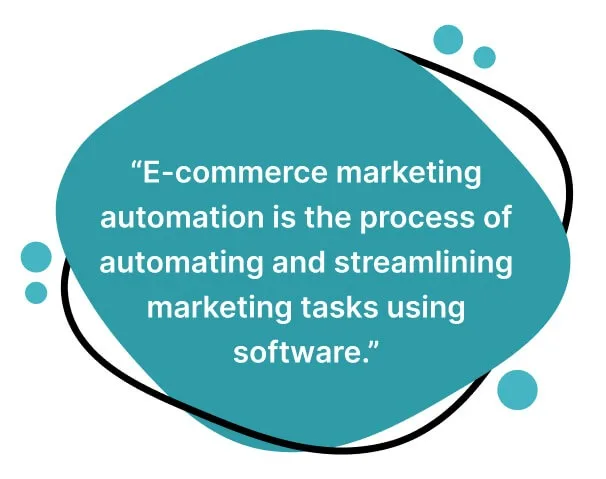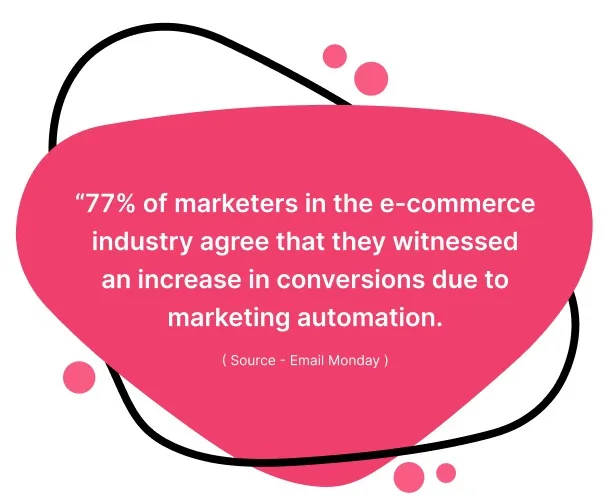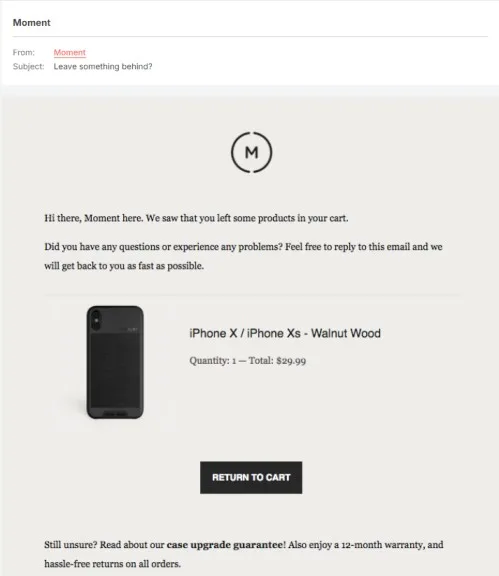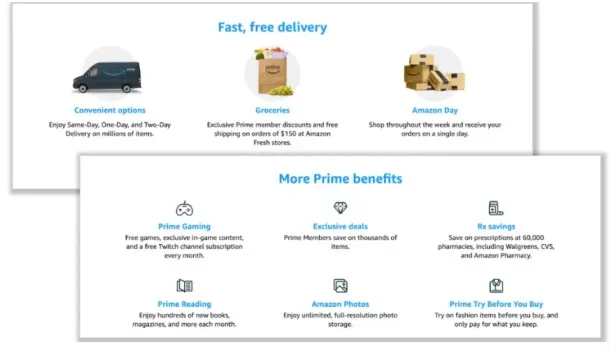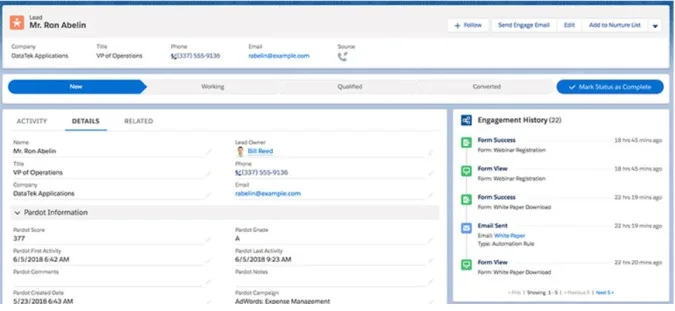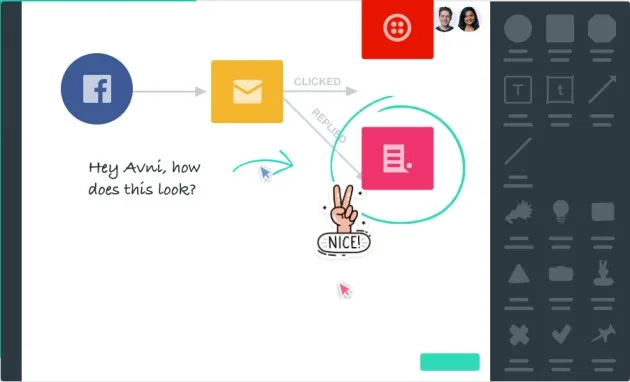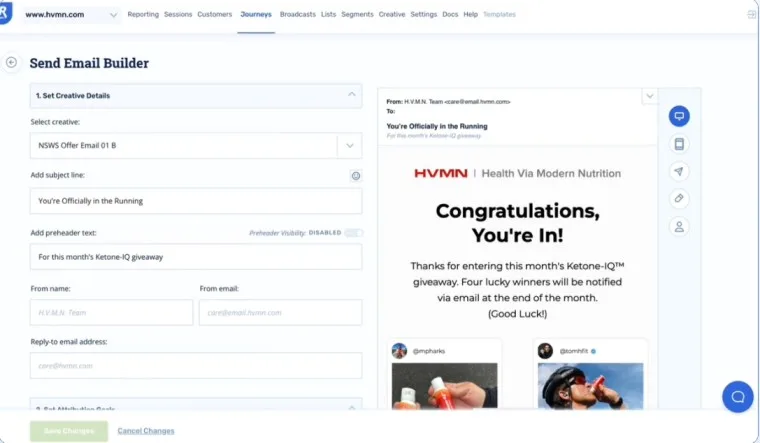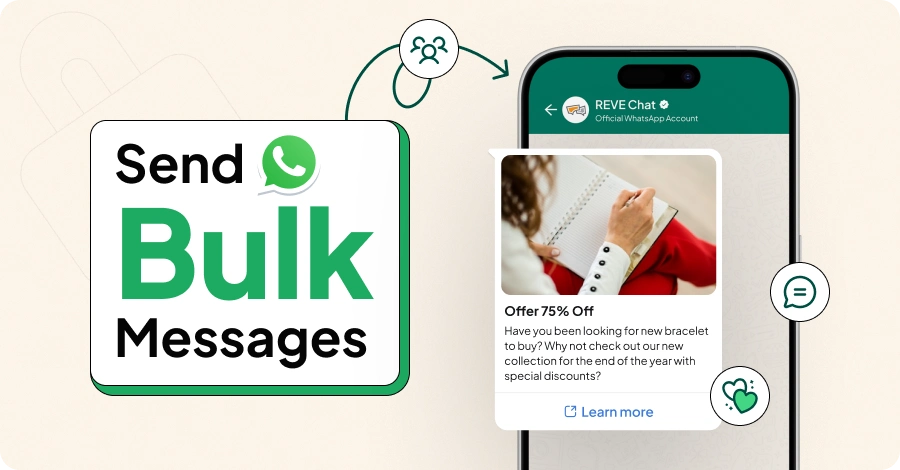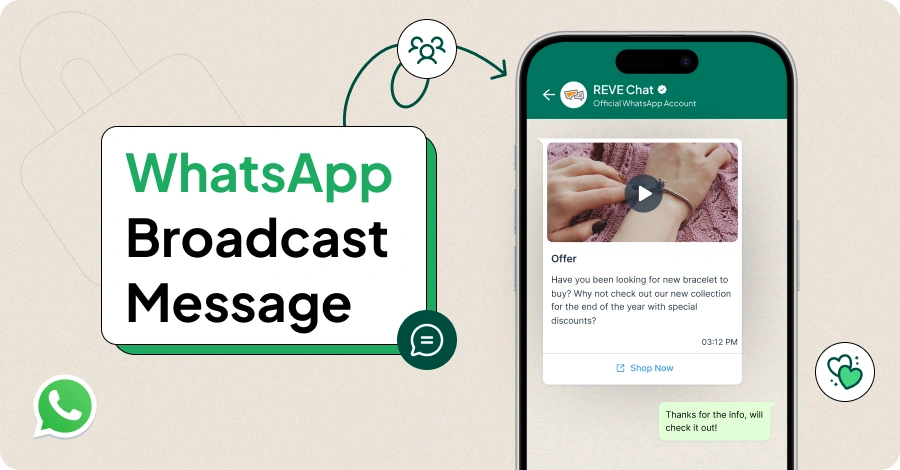E-commerce Marketing Automation:Strategies, Tools & Examples
- February 27, 2024
- 18 mins read
- Listen

A Lenskold Group study says that 63% of companies are outperforming and outsmarting competitors with help from marketing automation.
What does that suggest?
Well, marketing automation can be an invaluable tool for an ecommerce business. You can leverage its potential to reduce manual tasks and work more efficiently, eventually proving key in maximizing your marketing spend.
In addition, ecommerce marketing automation is essential to completing tasks without heavy reliance on human capital. Plus, there are some high-quality marketing automation software that can help build and automate campaigns across all channels. These tools can also help you personalize your marketing campaign to each customer’s behaviors, preferences, and touchpoints.
Marketing automation is an investment that your ecommerce business must make without blinking an eyelid. The benefits will easily outweigh the cost.
In this blog, we will explore marketing automation for ecommerce, and understand various strategies, benefits, tools, and software.
What is Ecommerce Marketing Automation?
Ecommerce marketing automation is the practice of replacing manual, repetitive marketing tasks with automation software. It’s the process of managing and monitoring repetitive workflows that are key aspects of marketing.
Marketing automation in ecommerce can also be termed as a strategic approach to put marketing on autopilot to reduce the reliance on human personnel and increase the efficiency of the processes.
Marketing automation is implemented to replace repetitive tasks with automated workflows so that marketers can have more time and energy to focus on other essential tasks at hand.
Benefits of eCommerce Marketing Automation
As a marketer, it may be good to ask, “Why should I automate my ecommerce business?”
Marketing automation is growing in demand across industries and ecommerce is no exception. More online retailers now look to benefit from automation and achieve their marketing goals timely.
There are many benefits of ecommerce marketing automation, including –
- Time Savings – Automation reduces the time spent on manual tasks. It also enables marketers to schedule and execute marketing strategies, activities, and campaigns in advance. This can free up, or save valuable time to be used elsewhere on other key aspects of the business.
-
Higher Time to Value – Marketing automation in ecommerce can provide higher time to value to your team. Since the advantages of automation are quick and immediate, your team needn’t be involved with each task and they can rather concentrate on other important tasks.
-
Future-focused campaigns – Automating routine marketing efforts can create more opportunities to interact and engage with customers and understand their needs or preferences. More interaction and engagement will bring more customer data that you can use to create future-focused campaigns. With tons of data in hand, you can easily automate next customer interactions with your brand and maximize your marketing efforts.
-
Design a perfect customer journey – Ecommerce marketing automation helps you set up real-time triggers for customer engagement. You can also set those triggers based on different scenarios and behaviors, eventually leading to automatic customer engagement. Automation also empowers you to personalize key aspects of the customer journey and remove the hassles that customers may face in completing the transaction.
-
Reduced Human Errors – Chances of error are always high when repetitive tasks are done manually. Your ecommerce enterprise can reduce human error by automating those tasks, resulting in improved efficiency in your marketing efforts.
-
Data-Driven Results – Implementing automation in marketing provides tons of useful data that can help you gain deep insights into customer behavior and campaign performance. The data can help you optimize your campaigns and gain better ROI and results.
-
Improved Customer Engagement – Marketing automation is key to delivering personalized messages and experiences based on the demographic data and purchase history of customers. When you adopt a personalized approach, it leads to increased engagement and stronger relationships with your customers.
-
Increased Sales and Conversions – When an ecommerce business automates its marketing campaigns, it can nurture leads better and recover abandoned carts. This can result in increased conversions and sales for the business.
Top 10 E-commerce Marketing Automation Strategies with Examples
1. Cart Abandonment Reminders
This sounds quite familiar – a buyer visits your online stores, browses through the product categories, and then to your delight, adds an item to their carts. However, the buyer does not complete the purchase and opts out for one reason or another. Your delight turns into despair.
Don’t lose hope as you can send card abandonment reminders to those nearly-buyers and hopefully induce them back in. Using well-crafted cart abandonment campaigns is a key ecommerce marketing automation strategy that is used by most stores.
You can send these campaigns on various channels and also add discounts and offers to inspire action. Email, SMS and WhatsApp are three key channels you can use for sending abandoned cart reminders.
Moment is a good example of how to get your cart abandonment emails right on target. Its email uses a clever subject line “Leave Something Behind” and then it goes on to discuss the product not bought. At the end of the mail, it places a clear CTA that directs people back to the cart and completes the purchase.
2. Send Out Triggered Emails
Emails are by far the most frequently automated channel for marketers, aren’t they? That’s why a lot of marketers rely on it to approach and engage with potential and existing customers. Take for example, sending out triggered emails is a popular ecommerce marketing automation strategy that is based on pre-defined actions, events, or user behavior.
You can send these emails for several purposes, including, as –
- Welcome emails
- Transactional emails
- Lead nurturing emails
In each case, you can send tailored and targeted messages on autopilot and ensure your messaging aligns with specific customer interactions.
For example, you can send a “Thank You” email when a buyer purchases something from your store. You can also send “Welcome emails when a customer signs up or subscribes to your newsletter. Similarly, transaction emails can be sent when customers order a product in your store. This mail can contain all the order details, including payment, delivery information, etc.
Avenue32 store is a good example of how to send a triggered email to customers. Its welcome email is very elaborate as not only greets customers but also gives them additional information about the brand.
3. Build Dynamic, Personalized Content
Does your online store use dynamic, personalized content that changes automatically based on user data or preferences? If not, you should start using it as a key ecommerce marketing automation strategy.
Dynamic content can be adjusted in real time based on the user’s profile and location. It can also adjust based on the browsing history of the user. You can use dynamic content on your web pages, emails, ads, and pop-ups to engage with customers better.
Most importantly, dynamic content can be personalized to enhance the customer experience when they visit your ecommerce store or receive your email.
Such content gives personalized experiences by showing customers targeted messages that meet their needs at every stage.
Asics is a good example of how to use dynamic and personalized content to serve and engage customers better. Its product page automatically displays nearby store details based on the customer’s location. So, in case a customer does not find any item in the store, he/she can immediately visit the physical store location provided on the page and complete the purchase.
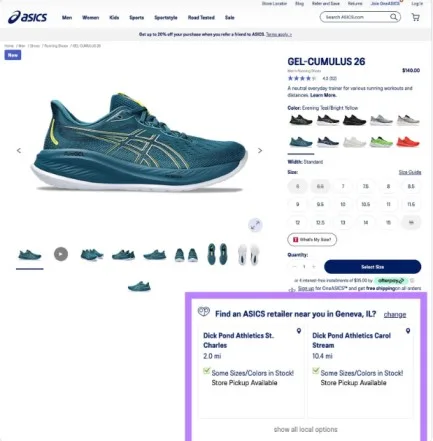
4. Automated Price Drop and Inventory Alerts
A lot of marketers use price drops and inventory alerts as an ecommerce marketing automation strategy to engage with potential customers better and boost conversion. Such alerts are routine to the ecommerce industry as they serve a variety of purposes.
It can tap into those customers who love discounts. In addition, a timely price drop alert might encourage those new customers who have still not decided whether to buy or not. Sending inventory alerts can help to convert those customers who visited your store to search for an item they could not find.
You can send those alerts through an email, SMS, WhatsApp message, or Push Notifications.
In the example below, you can clearly see how to subtly send an alert informing customers that the product they were looking is now has a price drop.

5. Re-Engagement Campaigns
How should you deal with inactive customers? Would you allow them to remain so, or take a well-directed effort to engage them?
You must re-engage them considering how acquiring new customers costs way more than retaining existing ones. This is why you can rely on re-engagement campaigns to target customers who somehow became inactive or drifted away.
These campaigns, when designed and directed well, can inspire and encourage inactive customers into action. They can also renew interest in them and hopeful push them towards your store.
If re-engagement campaigns were not successful, why would so many ecommerce stores continue to use them with high frequency?
Glow Recipe is a good example of how to use re-engagement campaigns as a subtle ecommerce marketing automation strategy and win back your inactive customers. In the email, it’s been mentioned how the customer has been inactive for long. It also encourages activity with a discount code offer that may work. If nothing works, the company also recommends
best-selling products in the hope that it might induce some activity in the customer.
6. Loyalty and Reward Programs
Loyal customers stand right behind you when others don’t. They support your business through thick and thin. And they are the reason you can feel relaxed, and also see the constant sales and revenue. But do you appreciate your loyal customers?
Running loyalty and reward programs is one of the important ecommerce marketing automation strategies you can use to show respect to those who stay loyal to your business.
You can offer discounts, points, coupons, and perks to most dedicated customers. You could also consider giving special access to your loyal customers. All this can lead to repeat purchases, together with a sense of belonging among your customers.
Amazon is a good example of how to use loyalty program automation to reward loyal customers. The company makes use of data analytics to refine its offerings and target personalized recommendations. Its Prime membership program, which is a loyalty program automation, offers members various perks like access to exclusive deals, free two-day shipping, and on top of that, the benefits of the Prime Video.
7. Chatbot Automation
Chatbots are quite smart these days, aren’t they? Thanks to the advances in AI and natural language processing, bots are no longer just tools for rule-based customer service. Their score has increased significantly with more ecommerce brands leveraging than ever before.
This is why chatbot automation today is among the defining e-commerce marketing automation strategies used by so many brands across the world. You can use an AI-powered bot to engage your audience, interact with them, offer them natural-sounding responses, and enhance their experience with your brand.
You can replace your live chat agent with a chatbot and continue to engage visitors like you earlier did. Your bot can also answer a variety of customer questions with ease.
Using the chatbot automation, you can do a variety of tasks, including –
- Answer FAQs on your online store
- Provide order status updates as and when customer needs
- Guide customers through product categories
- Help users with order placement
- Answer queries on returns and exchanges
- Collect customer reviews and ratings
- Run post-sales surveys
H&M is a good example of how to use chatbot automation to effectively guide users through the online store areas in alignment with their purchase desires. The bot is conversational and is developed to help mobile customers navigate their search through outfit possibilities easily. This is how they get customized results quickly.
8. Use Segmentation for Targeted Messaging
Using segmentation is a powerful ecommerce marketing automation strategy to drive conversions and boost sales. When you segment your customers ( or subscribers ), it helps you understand their needs better.
Let’s suppose for example – segmenting your contact based on key factors like age, profession, location, AOV, etc prepares you well to send them targeted messages.
The good thing, you can broaden your criteria for segmentation and trust your marketing automation software to help you personalize and send the message to the right users. You can also make messages highly targeted using tags, lists, and custom fields.
Boldking is a good example of how to get your segmentation strategy right. It adds a new dimension to gender-based ecommerce marketing by segmenting buyers into separate groups and sending them targeted messages.
9. Automate the Checkout Process
Low conversions are the result when your ecommerce website has a complicated checkout process. It can deter buyers from completing their purchase. That’s why your store should focus on adding smoothness and reliability to the checkout process.
Three easy ways to achieve an uncomplicated checkout process are –
- Use automation to make it convenient for buyers to fill in user details automatically
- Show preferred payment options to buyers
- Add a live chat option on the checkout page to help users during the buying stage
SuitShop is a good example of how to automate the checkout process to make the entire buying process smooth and hassle-free for customers. It adds a live chat on the store to give potential shoppers quick answers to size, shopping, and return-related questions.
10. Identify Prospects with Lead Scoring
Lead scoring is a very effective ecommerce marketing automation strategy you can use to identify sales-ready prospects and drive conversion rates. This strategy is helpful in cases where you want a subtle replacement for obtrusive sales techniques like spam emails, cold calling, etc.
Unlike most conventional methods that border on aggression, automated lead scoring feels anything but intrusive, so customers are less likely to get put off. In this method, you just need to assign scores to prospects based on their actions, engagements, interactions, identities, and other attributes you collect on your ecommerce website.
This type of lead scoring will involve marketing automation and AI in the form of a predictive lead scoring tool. You can then easily ascertain prospects that are ready for conversion and then target them with personalized messaging.
5 Best Ecommerce Marketing Automation Tools
|
Tool |
Best For |
Standout Feature |
Pricing |
|
Salesforce Pardot |
Smart marketing automation |
Advanced Lead Scoring and Grading capabilities. |
$1,250 to $15,000 per month |
|
ActiveCampaign |
Personalized email marketing automation |
Customer Experience Automation (CXA) |
$15/month to $145/month |
|
Autopilot |
Visual customer journey automation |
Email Automation Sequences |
$49/month to custom pricing |
|
MailChimp |
Marketing, Automation & Email |
Real-time Behavior Data and AI |
$1150/month to $ 28,875/month |
|
Rejoiner |
Basic Automation |
Interactive Automation Builder |
$25/month |
Successful marketing automation depends on the quality of the tools used. There are many versatile and feature-rich tools to automate different aspects of your ecommerce marketing.
Let’s look at 5 best ecommerce marketing automation tools –
1. Salesforce Pardot
Salesforce Pardot is one of the best automation ecommerce marketing tools to help businesses streamline their marketing processes and generate more leads. It offers a comprehensive range of features that can help improve marketing efforts on any scale. The main focus of this tool is on lead generation and nurturing, and it also gives control over email campaigns.
Use Cases
- Lead scoring & grading
- Engagement studio
- Triggers
- Actions
- Automation rules
Pricing
- Pardot pricing starts at $1,250 per month and it can go as high as up to $15,000 per month (Premium plan).
Supported Channels
- Email Marketing, Lead Generation, Sales, Forms
2. ActiveCampaign
ActiveCampaign is another effective marketing automation platform that suits the varied needs of small and mid-sized enterprises. Its main focus area lies in sending personalized emails, nurturing leads, and measuring results.
Use Cases
- It provides several event-tracking options for measuring the length of the customer journey or sales funnel.
- The tool allows you the option of creating campaigns and autoresponders and setting up rules for email triggers.
Pricing
- The price for the starter plan starts at $15/month and goes as high as $145/month for the Enterprise plan.
3. Autopilot
Autopilot is the right option when you are looking for an easy-to-use marketing automation tool. By using this tool, you can automate the entire customer journey.
Use Cases
- It also has a robust canvas for building email automation sequences.
- Marketers can annotate the sequences with fun stickers, explanations, and emojis.
Supported Channels
- This tool can be applied to various marketing channels including email, SMS, and in-app but it lacks a built-in CRM.
Pricing
- The base plan starts at $49/month and the Enterprise plan comes with custom pricing.
4. MailChimp
MailChimp is a popular and easy-to-use tool for ecommerce marketing automation. It has robust features for tracking all leads, managing contacts, and automation marketing emails. This tool suits businesses of all sizes and helps in creating, sending, and tracking emails.
Use Cases
- Using this tool’s Contact Tracking feature, it’s easy to track all your leads from signup to purchase.
- It allows the creation of custom email designs for each stage of the journey.
- The Automated Emails feature is beneficial for sending out automated messages based on specific events.
Supported Channels
- Email marketing, social media platforms, CRM, SMS, web integrations
Pricing
- Standard plan starts at $1150/month and goes as high as $ 28,875/month
5. Rejoiner
Rejoiner is a very effective marketing automation tool for those ecommerce companies that need basic automation features and tons of support for SMS marketing. It can add great value if you don’t want to allocate considerable resources to crafting campaigns.
Use Cases
- Using this tool, marketers can find various things including analytics and design.
- A drag-and-drop email builder and an interactive automation builder are also available.
Supported Channels
- Email, text, and direct mail
- Ecommerce marketing
- Postcards
Pricing
- Plans start at as low as $25/month
How to Choose the Right Marketing Automation Software for You
Looking for a suitable automation platform for your ecommerce marketing but not sure how to choose the right one? Well, you need careful consideration with a focus should selecting a platform that aligns with your business goals and budgets.
Here are a few things to consider when choosing the right marketing automation software for you –
Check whether the tool has standard features and functionality
An automation platform can meet your specific marketing needs only when it has standard features and functionality. Make sure the platform you choose has features for email marketing, segmentation, social channel integration, cart recovery, etc.
Analyze the integration capabilities of the tool
A good automation platform must seamlessly integrate with your CRM system, ecommerce platform, and other tools. Without these features, you might not be able to streamline processes and synchronize data as effectively as needed.
Assess the scalability of the tool
The platform you select for marketing automation must scale with your business growth. Its pricing and features should be flexible to scale with the increase in sales volumes and marketing needs.
Know the level of customization the tool offers
When you select an automation platform, it’s important to analyze the level of customization it offers. It should help you customize various aspects such as workflows and email templates to make your marketing campaigns effective.
Look into the analytics and reporting features of the tool
Quality automation tools come with robust customer analytics and reporting features. This helps them provide detailed insights into campaign performance. Some of the key analytics and reporting features to look for include A/B testing, conversion tracking, and ROI analysis.
Final Thoughts
In this exhaustive guide to ecommerce marketing automation, have touched upon various aspects, including the definition, benefits, strategies, and tools. All the discussions have centered around how marketing automation can transform your business operations. We saw how a strategic use of automation can positively impact various aspects of your business, be it customer communication, engagement, leads, and sales. With automation growing in prominence, more e-commerce entities can leverage their potential and capabilities to stay ahead of the competition.
Ecommerce Marketing Automation FAQs
What is ecommerce marketing automation?
Ecommerce marketing automation is the strategic approach of automating repetitive marketing tasks and processes. Ecommerce marketers use automation to scale their efforts and personalize experiences for shoppers, resulting in improved sales. Aspects that are mostly automated with ecommerce marketing automation include email campaigns, customer segmentation, cart recovery, and personalized recommendations.
How can I get started with marketing automation for my e-commerce store?
Getting started with marketing automation is simple. The steps are given below –
- You need to identify the goals of your ecommerce store
- Then you have to choose the right automation tools ( like Salesforce Pardot, Mailchimp)
- Integrate the tool with your store
- Segment your audience
- Create automated workflows
- Monitor and optimize your campaigns
What are some best e-commerce marketing automation tools?
Some best ecommerce marketing automation tools include Salesforce Pardot, MailChimp, Klaviyo, ActiveCampaign, Autopilot, and Rejoiner.
What is an example of ecommerce marketing automation?
Automating email campaign is a common example of ecommerce marketing automation. In this form of automation, the goal is to send an automated welcome or thank you mail to a customer as and when they sign up for a newsletter.
An automated email is also sent to a customer as a reminder when they add items to their cart but don’t complete the purchase.
In sending an automated email, marketers use predefined triggers that reduce manual effort and help drive engagement.
Can e-commerce marketing automation be used to increase customer retention?
Yes, ecommerce marketing automation can be used to increase customer retention. Three key strategies that you can use include –
- Automate personalized email campaigns
- Offer loyalty programs
- Boost engagement through targeted offers

